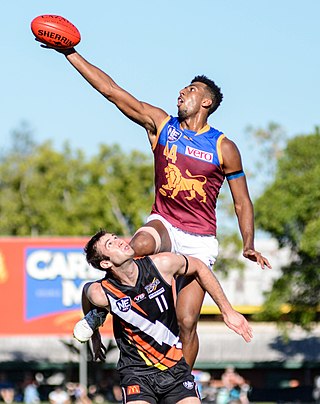
Australian football, also called Australian rules football or Aussie rules, or more simply football or footy, is a contact sport played between two teams of 18 players on an oval field, often a modified cricket ground. Points are scored by kicking the oval ball between the central goal posts, or between a central and outer post.
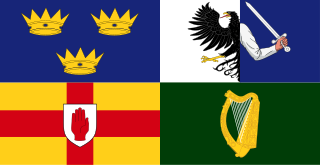
Sport in Ireland plays an important role in Irish society. The many sports played and followed in Ireland include Gaelic games, association football, horse racing, show jumping, greyhound racing, basketball, fishing, handball, motorsport, boxing, tennis, hockey, golf, rowing, cricket, and rugby union.
The Australian Football International Cup is a triennial international tournament in Australian rules football. It is the biggest international tournament in the sport that is open to all nations. More than 26 nations have participated and the competition has expanded into multiple pools and both men and women's divisions. At the time of the last tournament in 2017, the sport had a record 170,744 registered players outside Australia growing at a rate of 25% per annum.
The Australian Rules Football League of Ireland (ARFLI) is an Australian rules football competition and is the governing body of Australian Football in Ireland. Ireland is ranked the number three country in Australian football outside of Australia despite having a smaller league than some of its lower-ranked competitors. Ireland has been a competitor and finalist in all AFL International Cups and a winner twice. The success of the Irish team has commonly been attributed to the ease at which Gaelic footballers adapt to the Australian football because of certain similarities between the two codes.
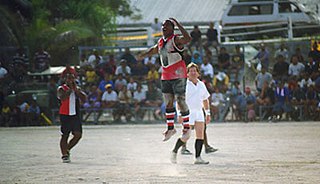
Australian rules football in Nauru dates back to the 1910s. Australian rules football became the national sport of Nauru after its independence in 1968. Today, its national participation rate is over 30%, the highest in the world.

The Geography of Australian rules football describes the sport of Australian rules football played in more than 60 countries around the world. By 2017 more than 26 nations had contested the Australian Football International Cup, the highest level of worldwide competition.

Australia has named a senior Australian Football team, known as the All-Australian team since 1947. This team, however has never officially played an international Australian rules football match. This is primarily because the sport is played professionally in Australia.
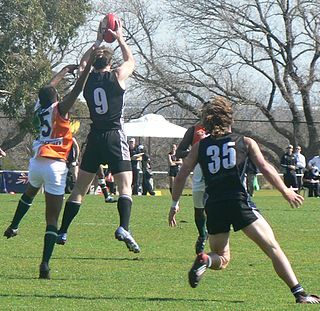
Australian rules football in New Zealand is notable as the first colony outside of Australia to take up the sport as early as the 1860s and was home to the first club formed outside Australia in 1876. The sport's official name was changed in 1890 to Australasian Football acknowledge New Zealand's participation and remained for some time even after the country was expelled from the Australasian Football Council. After a half century hiatus of organised competition, it has grown rapidly as an amateur sport. Today five of New Zealand's sixteen regions have organised competitions: Auckland ; Canterbury ; Wellington ; Waikato and Otago. A four-team national competition with a national draft has been contested at the North Harbour Stadium in Auckland since 2016 for men and 2019 for women. The national team were crowned International champions at the 2005 Australian Football International Cup and competed annually against the AFL Academy between 2012 and 2019. Since the 2010s the game has also grown at junior level among New Zealand schools as the "Hawks Cup".

Australian rules football in Canada is played in seven provinces - Ontario, Alberta, Nova Scotia, Newfoundland and Labrador, Quebec, British Columbia and Saskatchewan. The Ontario league, centred on Toronto is a nine-team league, including sides from cities as far afield as Guelph, Hamilton and Ottawa. In western Canada, there are clubs in Edmonton, Calgary and a six-team league in the Vancouver area. There is also a number of junior and women's clubs across Canada.
Australian rules football in Japan describes the development of the team sport which dates back to 1910, but found its roots in the late 1980s mainly due to the influence of Australian Football appearing on Japanese television.

Australian rules football in Papua New Guinea (PNG) is a developing team sport which was initially introduced by Australian servicemen during World War II. The governing body for the sport is the PNG Rules Football Council, with the development body being AFL PNG. The junior development version is known locally as Niukick. Regionally, AFL PNG is affiliated with AFL Oceania.
Australian rules football in South Africa is a team sport played at amateur level in the country with a small audience. The governing body is AFL South Africa.
The AFL Commission is the governing body of the Australian Football League Limited (AFL), its subsidiaries and controlled entities. Richard Goyder has been chairman since 4 April 2017, replacing Mike Fitzpatrick.
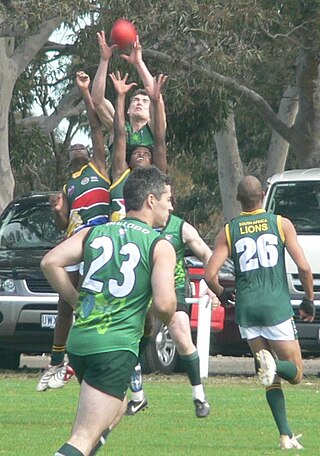
Australian rules football in Ireland began in 1999 when clubs were simultaneously formed in Dublin and Belfast, however awareness of Australian rules football dates back to the 20th century due to similarities with Gaelic football and the country subsequently became a source of players for professional leagues in Australia, particularly the Australian Football League (AFL) and later the AFL Women's (AFLW) through the Irish Experiment which is ongoing. It is governed by AFL Ireland which is a member of AFL Europe.

Australian rules football began its evolution in Melbourne, Australia about 1858. The origins of Australian football before 1858 are still the subject of much debate, as there were a multitude of football games in Britain, Europe, Ireland and Australia whose rules influenced the early football games played in Melbourne.

Australian rules football is the most watched and attended sport and the second most participated code of football in Australia. Since originating in Victoria in 1858 and spreading elsewhere from 1866, it has been played continuously in every Australian state since 1903 plus the two major territories since 1916.
Australian rules football in Samoa has been played since 1997.

The Australian National Football Council (ANFC) was the national governing body for Australian rules football in Australia from 1906 until 1995. The council was a body of delegates representing each of the principal leagues which controlled the sport in their respective regions. The council was the owner of the laws of the game and managed interstate administrative and football matters. Its function was superseded by the AFL Commission.

Australian rules football in Oceania is the sport of Australian rules football as it is watched and played in the Oceanian continent. The regional governing and development body is AFL South Pacific it is affiliated to the AFL Commission and was formed in 2008.

The sport of Australian rules football has been called by a number of different names throughout its history. Since 1905, with the formation of the Australasian Football Council, the game has been called "Australian football". The name has been codified by the AFL Commission, as the game's name in the "Laws of Australian football". Historically, the sport has been referred to as "Victorian rules", the "Victorian game", "Australasian rules", the "Australian game" and "Australian national football", "national football", the "bouncing game" and, derisively, "aerial ping pong" as well as several other names. Today, the common names for the sport are "Australian Football" and "Australian rules football" and it is referred to as "football", "footy", "Aussie rules" or sometimes as "AFL".












